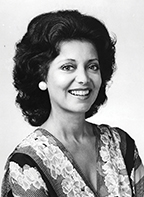America’s first Black soap opera star was also an acclaimed Broadway and film actress.
Submitted by Cheryl Duncan
NEW YORK — Trailblazing American actress Ellen Holly, the first Black person to star in a soap opera, has died. The White Plains resident, who helped change the face of daytime television with her lead role on One Life to Live, passed away peacefully in her sleep Wednesday at the age of 92 at Calvary Hospital in the Bronx, New York.
Holly was born on January 16, 1931, in Manhattan to parents William Garnet Holly, a chemical engineer, and Grayce Holly, a housewife and writer. Ellen Holly’s was a prominent Black family that included her paternal great-grandmother, Susan Smith McKinney Steward, the first African American woman to earn a medical doctorate (MD) in New York State and the third in the United States; her great aunt Minsarah Smith Thompson Garnet, a suffragette and the first Black female principal of a New York City school; Minsarah’s husband, the Rev. Henry Highland Garnet, an abolitionist who was appointed Minister (ambassador) to Liberia by President James A. Garfield; her great-grandfather the Rev. James Theodore Holly, the first African American to be ordained a bishop in the Protestant Episcopal Church and a prominent missionary to Haiti; and her great-great grandfather Sylvanus Smith, one of the leaders of the movement urging Black people to purchase land in Kings County, New York, in an area later known as the Weeksville settlement and a landowner there. Her maternal aunt Anna Arnold Hedgeman was the first Black woman to be in the cabinet of a New York City mayor (Robert F. Wagner Jr.), one of the lead organizers of the March on Washington and a founding member of the National Organization of Women.
Holly herself grew up in Richmond Hill, Queens. A graduate of Hunter College, she became a member of the Delta Sigma Theta Sorority, Inc. during her college years.
Holly began her acting career on New York City and Boston stages, earning instant critical acclaim. She made her Broadway debut in Too Late the Phalarope in 1956 and she went on to star in the Broadway productions Face of a Hero, Tiger Tiger Burning Bright and A Hand is on the Gate. From 1958 to 1973, she led productions of numerous Joseph Papp New York Shakespeare Festival productions. Throughout her years in the theater, she worked opposite such luminaries as Roscoe Lee Browne, James Earl Jones, Jack Lemmon, Barry Sullivan and Cicely Tyson. Holly also studied with dance pioneer Katherine Dunham and was passionate about the role of dance in revealing the richness of African American culture.
Her first roles on television included appearances on The Big Story (1957), The Defenders (1963), Sam Benedict (1963), Dr. Kildare (1964) and The Doctors and the Nurses (1963 and 1964).
Holly played the groundbreaking character Carla Gray on the hit ABC show One Life to Live from 1968 to 1980 and 1983 to 1985. She was personally chosen for the role by television producer Agnes Nixon after she saw a New York Times opinion piece that Holly wrote called “How Black Do You Have To Be?” about the difficulty of finding roles as a light-skinned Black woman. The first time a Black person starred in a soap opera, it was a watershed moment, coming as it did during the turbulent and racially divisive 1960s. Carla’s attempt to come to terms with her racial identity and her love triangle with two doctors — one white, the other Black — helped launch viewership of the nascent soap opera into the stratosphere. Holly exploded onto the pages and covers of publications like Newsweek, TV Guide, Ebony, Soap Opera Digest, and the New York Times. Soon there were Black story lines on All My Children and General Hospital, helping ABC to dominate daytime for two decades. In later years, Holly spoke out about being underpaid and other mistreatments she claimed she and some of her fellow Black cast mates received from show executives despite their contributions to the show’s success.
She continued to appear on the small screen, with a recurring role as a judge on The Guiding Light from 1988 to 1993 and In The Heat of the Night from 1989 to 1990 as well as the television movie 10,000 Black Men Named George, alongside Andre Braugher and Mario Van Peebles.
She also appeared on the big screen in Take a Giant Step, Cops and Robbers and Spike Lee’s School Daze.
An accomplished writer, over the years, Holly wrote numerous pieces for the New York Times. In 1996, her autobiography, One Life: The Autobiography of an African American Actress, was published. Reflective of a life dedicated to the arts and civil rights causes, in her final years she began preparations on a documentary about her life and the storied activism of her family.
In the 1990s, she took the civil service examination and became a librarian, serving as such for many years at White Plains Public Library. In her autobiography, she referred to her years there as some of the happiest of her life.
Holly had many friends and was a well-loved member of her White Plains community. She was predeceased by her younger sister, Jean H. Gant, and her niece, Holly Gant Jones. She Is survived by her grand-nieces Alexa and Ashley Jones (White Plains), daughters of her beloved niece, Holly Gant Jones, who predeceased her, and their father, Xavier Jones; first cousins Wanda Parsons Harris (Dayton, Ohio), Julie Adams Strandberg (Providence, Rhode Island), Carolyn Adams-Kahn (New York), Clinton Arnold (Los Angeles) and a host of other loving family members. She is sorely missed and mightily celebrated.
In keeping with Holly’s wishes there will be no funeral. As an expression of sympathy, donations may be made to The Obama Presidential Center or St. Jude Children’s Research Hospital.

